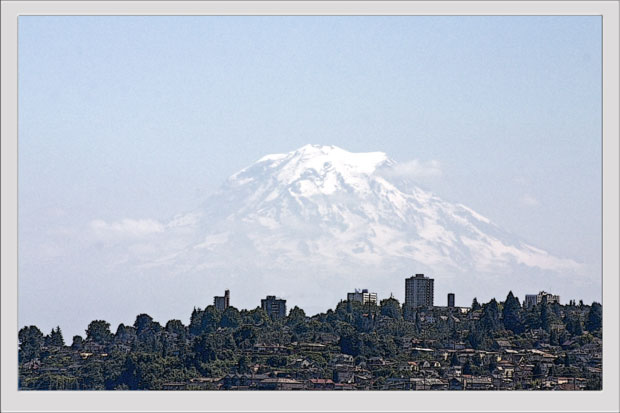Though I don’t like Levertov’s later poems as much as her earlier ones, there are still some I’m quite enthralled with. Perhaps only someone from the Pacific Northwest would choose the poems I’ve chosen here from Denise Levertov’s final poems, but luckily this is my blog not a formal review and I only have to tell you which poems I identify with, not which ones are her best poems, even though I’d like to think the two are occasionally the same.
Any Christianity I subscribe to is at best non-traditional, so I find it difficult to identify with many of Levertov’s poems written in the Catholic tradition, though I am strangely fond of a long one, perhaps the most traditional of all, called “Mass for the Days of St. Thomas Didymus.�?
However, the poems that most appeal to me refer to Levertov’s final home in the Pacific Northwest, particularly those that use Mt. Rainier as a symbol:
Open Secret
Perhaps one day I shall let myself
approach the mountain—
hear the streams which must flow down it,
lie in a flowering meadow, even
touch my hand to the snow.
Perhaps not. I have no longing to do so.
I have visited other mountain heights.
This one is not, I think, to be known
by close scrutiny, by touch of foot or hand
or entire outstretched body; not by any
familiarity of behavior, any acquaintance
with its geology or the scarring roads
humans have carved in its flanks.
This mountain’s power
lies in the open secret of its remote
apparition, silvery low-relief
coming and going moonlike at the horizon,
always loftier, lonelier, than I ever remember

I would expect this kind of poem from someone who grew up in Seattle, not someone transplanted here. Mt. Rainier is an ever-present force here in the Northwest, and many of us who grew up here judge what kind of day it’s going to be by whether or not we can see the mountain on our way to school or work.
Levertov is right that the mountain is a presence (just as God is a presence?) whether you ever actually touch it directly or not. Though I love seeing the mountain hanging mid-air, I prefer to hike less visited areas perhaps because you’re actually more aware of the mountain’s presence when you’re walking other parts of the Cascades and look up to see it looming over you.
As I used to look at Rainier I could understand why the Greeks considered Mt. Olympus the home of the Gods. Part of earth, the mountain seems, distant, pure, above-it-all yet the most obvious part of all.
Apparently Levertov lived in the Northwest long enough to observe another common phenomena around here:
Witness
Sometimes the mountain
is hidden from me in veils
of cloud, sometimes
I am hidden from the mountain
in veils of inattention, apathy, fatigue,
when I forget or refuse to go
down to the shore or a few yards
up the road, on a clear day,
to reconfirm
that witnessing presence..
In my neighborhood, houses that have a view of Mt. Rainier sell for hundreds of thousands more than my far-too-spendy home. I wouldn’t pay for a view lot even if I could afford one because I consider it a waste of money but, more importantly, because I’m afraid that, like most things, if I were exposed to the mountain every time I looked out the front window too soon I wouldn’t see the it at all.
It’s already too easy to just walk by the front flower garden on my way out to the wildlife refuge and forget there are flowers, bees, butterflies, and hummingbirds there continually throughout the day. I don’t want to become blind to the mountain, too.
